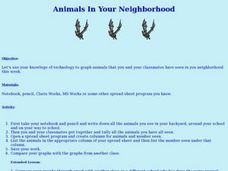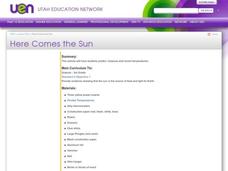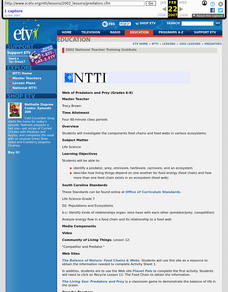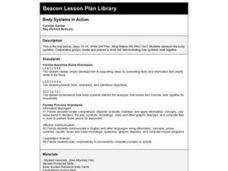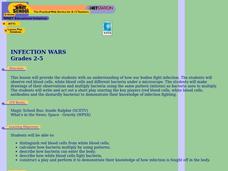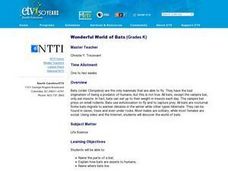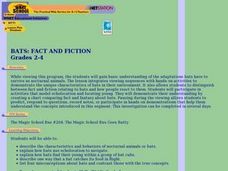Curated OER
If I Were A Raindrop!
Students review the water cycle. For this water cycle lesson, students review the different stages of the water cycle. Students use the computer program Kid Pix Weather to help demonstrate understanding.
Curated OER
Constellations
Fifth graders create their own constellations using pin holes and black paper. In this space science lesson, 5th graders write a story about their constellation. They share their project with the class.
Curated OER
Graphing: Ocean Floor
Learners graph the ocean floor using given data. For this earth science lesson, students label different oceanic features on the map. They answer questions at the end of the lab.
Curated OER
Animals In Your Neighborhood
Students make list of all animals they have seen in their backyards, neighborhoods, and around school in past week, graph animals using computer spreadsheet program, and compare graphs through email with students in another class.
Curated OER
Insect Communication and Harmful Insects
Seventh graders use children's literature in order to create an interesting context for the lesson. The concept of insect communication is investigated in order for students to form educated hypothesis guesses.
Curated OER
Green Apples
Third graders brainstorm the effects of light on the growth of plants. In groups, they participate in various activities in which they grow alfalfa sprouts and lima beans. They complete a worksheet on how the varying amount of light...
Curated OER
Water World Story
Fourth graders write a story about how a drop of water may have traveled to school. They design a presentation on the water cycle.
Curated OER
What's Down There
Third graders gather and examine samples from the school outdoor environment. They compare/contrast their samples with those of other students. Students record the results of their observations.
Curated OER
Lend Me Your Ear
Students engage in a lesson to investigate some of the properties of sound. They create sounds and listen to the vibrations that are made while listing all the sounds that are heard. This is done while the eyes are closed to strengthen...
Curated OER
Is It Hot in the Light?
Third graders make observations about the temperature of items in direct sunlight. In groups, they discuss why asphalt, brick and cement are warmer than items surrounding them. To end the lesson, they examine how heat transfers energy...
Curated OER
Here Comes the Sun
Third graders watch a video on the solar system and examine the role of the sun. As a class, they complete a KWL chart and make different color temperature pockets to use during their experiment. In groups, they make predictions about...
Curated OER
Turn Off That TV!
To honor Screen Free Week, how can you challenge your class to turn off the TV May 5-11, 2014?
Curated OER
HOW BODY SYSTEMS INTERACT
Students study that the human body is made up of different systems whose functions are related. They draw and label their traced body outlines which include at least five body systems.
Curated OER
An Emerald Place
Students discover four layers of the rain forest and identify the life of animals at each level.
Curated OER
Web of Predators and Prey
Young scholars investigate the components food chains and food webs in various ecosystems. They describe how living things depend on one another for food energy (food chain) and how more than one food chain exists in an ecosystem
Curated OER
Body Systems in Action
Fifth graders, in groups, create a short skit that shows how body systems work together.
Curated OER
Infection Wars
Young scholars explore how our bodies fight infection. Using a microscope, they observe red blood cells, white blood cells and different bacteria under a microscope.
Curated OER
Here's the Pitch
Students define pitch, measure varying amounts of water into containers, make predictions about the sounds made when striking the containers, put containers in order from highest to lowest pitch, and create their own sound patterns with...
Curated OER
Wonderful World of Bats
Students create a book about bats. They write a letter to a scientist containing questions about bats. They compare the socialization of bats to humans; compare the needs of bats to humans and other animals.
Curated OER
The Amazing Ant
Students explain that ants are an important element of nature's balance. Ants eat many insects and are food to other animals. They watch a video and conduct hands-on activities that give them an excellent overview of the ants role in...
Curated OER
Kaboom!
Students identify the three ingredients of weather.. They create weather vanes, thermometers, and rain gauges.
Curated OER
Ocean Life
Students explore the types of plants and animals that can be found in the ocean. They browse books and/or magazines to identify and gain a knowledge base of plant and animal life found in the ocean, then create a collage.
Curated OER
Hop To It!
Students explore the aspects of a frog's anatomy that allow it to be such a good jumper and jump and record the length of each jump to determine which style of jumping allows them to jump the farthest.
Curated OER
Bats: Fact and Fiction
Students describe the characteristics and behaviors of bats. After viewing a video, they explain how bats use echolocation to navigate and how they find their young within a group. They list four misconceptions about the animal and...





